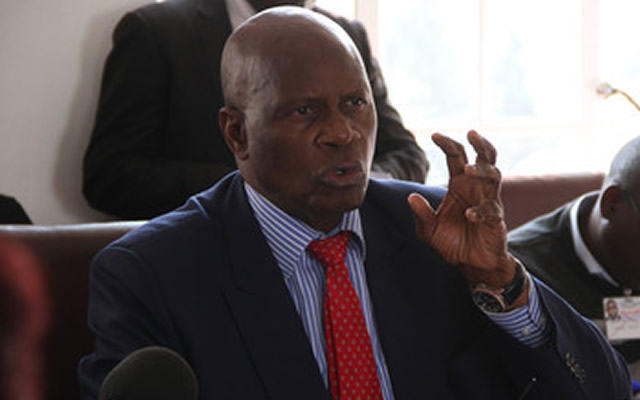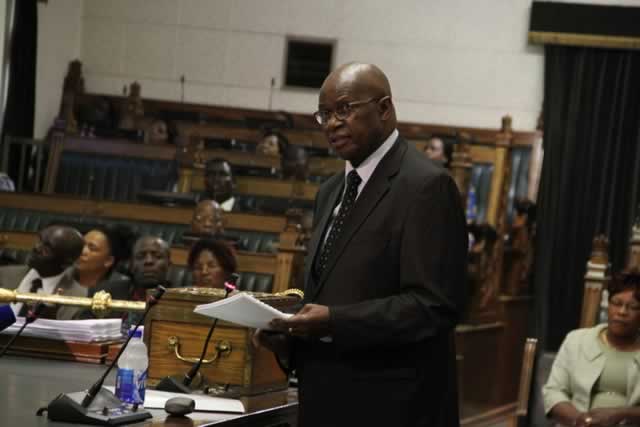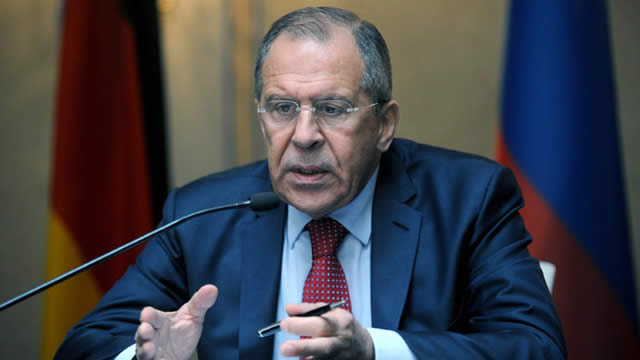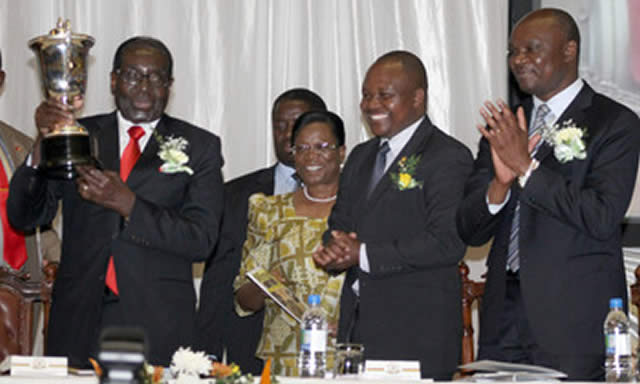Hike in taxes on fuel, airtime •Move to boost revenue inflows •Non-essential imports to go


Finance Minister Patrick Chinamasa presents the 2014 Mid-Term Fiscal Policy Review Statement in Parliament yesterday
Happiness Zengeni Business Editor—
TAX on petrol and diesel rises 5c a litre today, while a 5 percent excise duty will be imposed on airtime from Monday as Government introduces a raft of measures to enhance revenue to meet its expenditure obligations. With effect from today, excise duty on diesel and petrol will be increased to 30 and 35 cents per litre from 25 and 30 cents.
This will effectively result in an increase in the price of fuel.
Presenting his Mid-Term Review statement in Parliament yesterday, Finance and Economic Development Minister Patrick Chinamasa said such measures seek to enhance revenue, curb the influx of non-essential imports as well as strengthen tax administration.
He said the slowdown in gross domestic product growth, which has now been forecast at 3.1 percent from the initial 6,1 percent, had seen reduced revenue collections and depressed exports and imports.
Government revenues are now projected to be below the targeted $4,12 billion to $3,85 billion.
Expenditure is projected at $4,12 billion but could even be more as $3,2 billion will now be spent on employment costs against the initial estimate of $2,99 billion.
Minister Chinamasa said the wider deficit will be offset by interventions which include support for agriculture and the domestic industry, formalisation of business activities for tax purposes, parastatal reforms and the Debt Resolution Strategy.
The minister will also levy excise duty of 5 percent on air time for voice and data with effect from September 15. Customs duty at 25 percent on mobile handsets will be levied with effect from October 2014.
“Honourable Members would recall that Government reduced rates of customs duty on mobile handsets, with effect from 1 August 2009, in recognition of access to information as an essential tool to enhance decision making in the global village, and also to encourage the development of Information Communication Technology (ICT), in line with international trends.
“Handset purchases have increased significantly and mobile telephone penetration rates have also increased substantially to over 100 percent. Customs duty reduction has, thus, achieved its intended purpose.
“I, therefore, propose to levy customs duty on mobile handsets at a rate of 25 percent, with effect from 1 October 2014.”
Minister Chinamasa also reviewed duty on cooking oil, poultry, soap, maize meal, flour, beverages, dairy produce, furniture, sugar, fresh and canned fruits and vegetables, among others as the influx of imports, continues to undermine growth of the agricultural sector and recovery of the local industry.
The minister also proposed a tax on fringe benefits and will empower Zimra to collect assessed taxes directly from employees or board members, who are currently serving, have resigned or retired from the institutions.
Listen to the full statement here….
He noted that a number of organisations remunerate employees through fringe benefits which include cash and non-cash payments over and above their salaries and wages. Benefits range from the use of a company vehicle or accommodation, access to low interest loans and other subsidised or discounted goods and services, among others.
“We need to restore equity and fairness to those employees who do not receive fringe benefits and also enable the tax administration to fairly assess taxpayer liability, gross income includes any amount equal to the value of an advantage or benefit in respect of employment, service, office or other gainful occupation.
“Whereas the Income Tax Act obligates employers to deduct and remit PAYE to the Zimbabwe Revenue Authority, the trend that has been observed, especially in public enterprises, is that fringe benefits were not subjected to employees’ tax,” explained Chinamasa.
He also proposed six months tax amnesty on all taxpayers in respect of their tax obligations for the period February 1 to September 30 2014 with effect from October 1. “To facilitate disclosure, the whistle blower facility will be suspended during the Amnesty period.” He further said that no penalties and interest will accrue on the tax obligations within the period of amnesty.
Other revenue measures include an increase in property rentals and contributions from A2 beneficiaries of the land reform programme.
Interventions to the productive sector include the exemption of export tax for the sale of raw hides and skins for the period January to December 2014. In order to discourage minimum value addition through cut and trim, Minister Chinamasa proposed to levy customs duty on blankets imported as raw materials, with effect from 1 October 2014.
Furthermore, in line with the Zimbabwe Leather Sector Strategy (2012-2017), export tax of 15 percent will apply on exports of raw hides other than domesticated bovine animals such as goats and sheep, beyond the export quota.
Minister Chinamasa increased customs duty on single cabs (-1400kgs), double cab, buses (26 passengers and above) and passenger motor vehicles of engine capacity below 1500cc at rates between 40-60 percent.
Read the full statement here…..
Furthermore, Government Departments and parastatals will purchase motor vehicles from the local assembly plants in line with the Directive from the Office of the President and Cabinet issued through Circular Number 16 of 2011.
Meanwhile, Minister Chinamasa reviewed downwards the royalty on gold produced by primary producers to 5 percent from 7 percent while presumptive tax on small scale gold miners to 0 percent from the current 2 percent.
The Highlights
- GDP growth for the year revised downwards from 6.1 percent to 3.1 percent
- Excise duty on diesel and petrol increased to 30 and 35 cents per litre from 25 and 30 cents per litre, respectively, with effect from September 12, 2014.
- Levy excise duty of 5 percent on air time for voice and data, with effect from September 15 2014.
- Levy customs duty on mobile handsets at a rate of 25 percent, with effect from October 1, 2014.
- Increase customs duty on the motor vehicles.
- Levy customs duty on blankets imported as raw materials, with effect from October 1 2014.
- Review downwards, royalty on gold produced by primary producers from 7 to 5 percent.
- Duty structure on the cooking oil, poultry, soap, maize meal, flour, beverages, dairy produce, furniture, sugar, fresh and canned fruits and vegetables, among others, reviewed.
- A2 beneficiaries of the land reform programme to contribute towards the cost of survey of the land allocated.
- Government to ensure early accessibility to inputs and support for early planting.
- Government setting aside resources in support of cloud seeding.
- Government in collaboration with other key stakeholders such as input suppliers, financiers and farmers, putting in place various financing strategies in support of the 2014-15 agriculture season.
- Government mobilising about $252.3 million in support of agriculture under the Presidential Inputs Scheme for the 2014/15 season.
- Government to capacitate 1 600 000 Communal, Old Resettlement, Former Small Scale Purchase Areas and A1 Households to be self-sufficient in food.










Comments